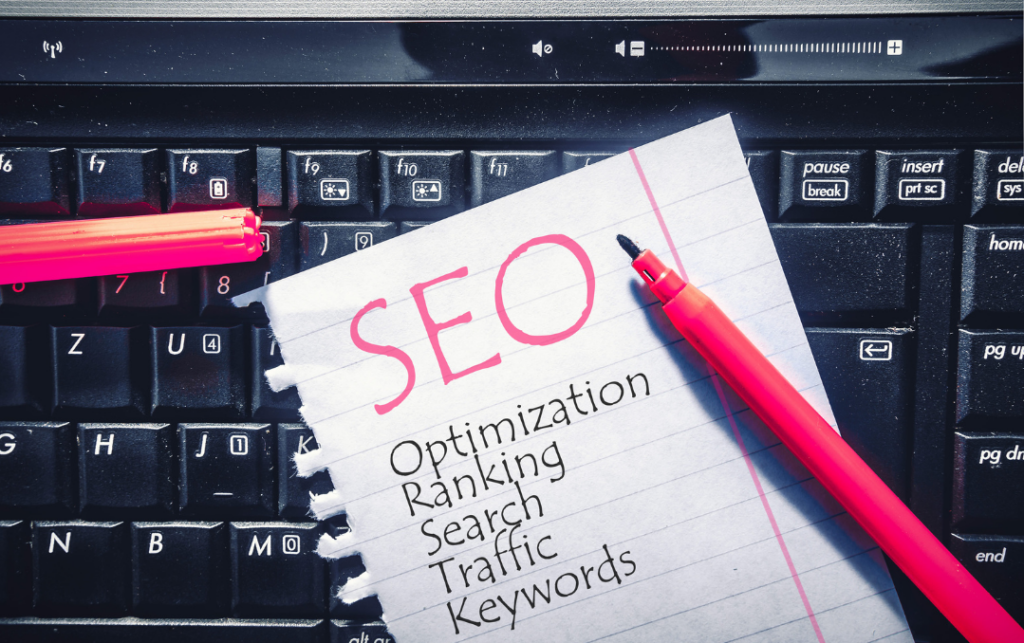
In a nutshell:
1. introduction to SEO
1.1 What is SEO?
1.2 Why is SEO important?
1.3 What are the benefits of SEO?
2. How do I optimise my website for SEO?
3. summary
In the following guide, we will discuss what exactly SEO is, why it is important, the benefits it brings and how to optimise your website effectively. You will learn how to improve your website's visibility in search results and increase its effectiveness.

Introduction to SEO
Nowadays, with most customers starting their search online, Search engine optimisation (SEO) has become a key element of any marketing strategy. SEO pozwala na lepszą widoczność strony w wynikach wyszukiwania, co przekłada się na zwiększenie ruchu, budowanie zaufania do marki i ostatecznie – na wzrost sprzedaży.
What is SEO?
SEO, or Search Engine Optimisation, is the process of adapting a website to make it as visible as possible in organic search results, especially on Google.
Optimisation includes various measures such as improving the quality of content, increasing page load speed, building valuable links and adjusting the structure of the website. The aim of SEO is to ensure that your website is easy to find by potential customerswhen they are looking for products, services or information related to your industry.
Why is SEO important?
Key statistics
- Google dominates the search engine market, controlling more than 85% of the global market. What's more, 75% users never makes it to the second page of search results, which means that being at the top of the results is extremely important.
- Organic results (i.e. those not paid for) generate 53% of total website traffic, making SEO far more influential in attracting customers than social media or paid advertising.
- A website that is ranked first in Google's search results can achieve a click-through rate (CTR) of 28,5%.
Is your website not generating the expected profits?
Have an SEO audit carried out.
What are the benefits of SEO?
Increased traffic and visibility
SEO allows you to increase the visibility of your website in search results, which leads to more visitors. The more people who visit your site, the better your chances of conversion - that is, converting visitors into customers.
Building trust and credibility
High positions in search results are often seen as proof of a website's credibility and quality. Sites that are in the top positions gain the trust of users, which is crucial for building long-term relationships with customers.
Improving user experience (UX)
Optymalizacja techniczna strony, obejmująca szybkość ładowania, responsywność i łatwość nawigacji, sprawia, że użytkownicy chętniej pozostają na stronie. Dobrze zaprojektowana strona poprawia również współczynnik konwersji, ponieważ ułatwia użytkownikom dotarcie do interesujących ich treści.
Increasing competitive advantage
Investing in SEO allows you to stay ahead of the competition, especially if your efforts are more effective and better planned. A good SEO strategy can help your business rank higher in search results and attract more customers than your competitors.

How do I optimise my website for SEO?
1. Conduct an SEO audit
Rozpocznij od dokładnej analizy swojej strony, aby zidentyfikować obszary wymagające poprawy. Skorzystaj z narzędzi takich jak Google Analytics i SEMrush, aby zdiagnozować potencjalne problemy, takie jak wolne ładowanie się strony, błędy indeksowania czy niskiej jakości treści.
2. Optimise the technical aspects of the website
Make sure your website is fast, responsive and easy to navigate. Focus on optimising images, minifying CSS and JavaScript files and using CDNs to speed up page loading. Check that the URL structure is clear and includes keywords.
3. Work on your keyword strategy
Conduct keyword research to identify the phrases that are most relevant to your business. Choose the keywords that best suit your offer and create content that is optimised for them. Focus on long tail phrases that can attract more targeted traffic.
Wondering how to match keywords to your business?
Read this article:
4. Create valuable content
Publish content that answers your customers' questions and problems. Make sure your content is clear, well-organised and contains keywords in a natural way. Optimise meta titles and descriptions to increase appeal and clickability.
5. Build links
Take care of internal links that improve your site's navigation, and acquire valuable external links from other sites. External links increase the authority of your site and improve its position in search results.
6. Monitor and adjust strategy
Regularly monitor the effects of your SEO efforts using tools such as Google Search Console and Google Analytics. Based on the data collected, adjust your strategy to respond to changing market conditions and stay competitive.

Summary
SEO is a long-term strategy that brings real benefits in the form of increased traffic, better visibility and higher conversions. Successfully optimising your website for SEO requires constant monitoring, adjusting your strategy and attention to every aspect, from content to technical details. An investment in SEO can make a significant contribution to the success of your business in the online world.


 4 minutes reading
4 minutes reading


